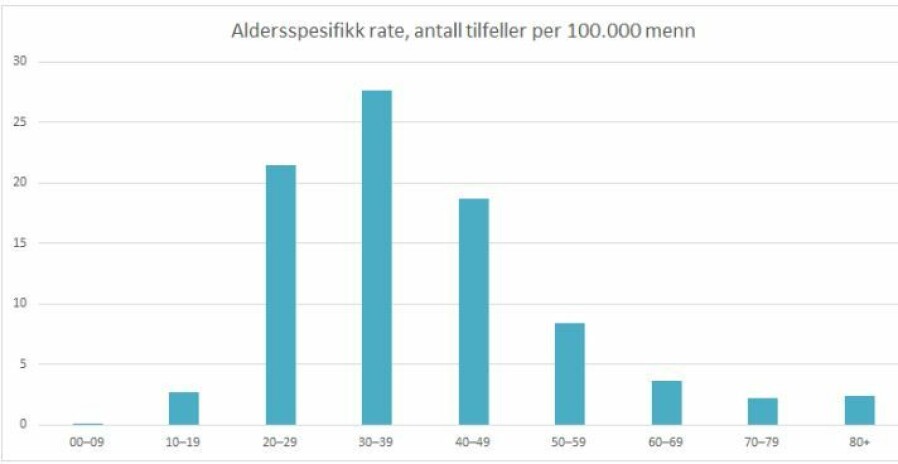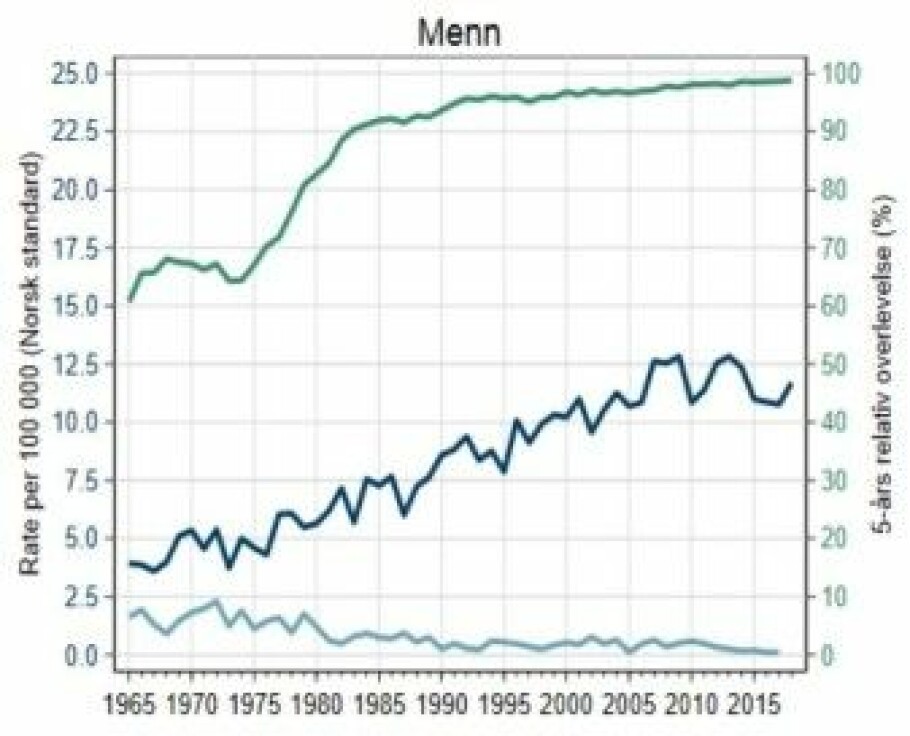
Why testicular cancer can cause weight problems
Researchers at the Cancer Registry of Norway have investigated why many men who survive testicular cancer later suffer from weight problems and high blood pressure. They found greater epigenetic changes in survivors than in other men.
More than nine in ten people with testicular cancer survive. But the treatment may have its price. Men who have been treated for testicular cancer are at increased risk of developing metabolic syndrome later in life.
“These survivors are more prone to put on weight, especially around their belly. They more often develop high blood pressure, high insulin levels and unfavourable cholesterol levels,” says researcher Trine Rounge at the Cancer Registry of Norway.
These conditions can in turn lead to diabetes, heart disease, stroke or narrowed arteries in the legs.
Why this happens has been unknown. Now researchers at the Cancer Registry of Norway have mapped more of the causes.
Examined men after treatment
Testicular cancer is the most common cancer among young men. Most men are 20 to 30 years old when the cancer strikes.
Researchers at the Cancer Registry of Norway have examined a group of men 16 years after they were treated for testicular cancer. The study was done with national partners.
The researchers took blood samples from the participants and isolated their DNA to see if the gene expression had changed. The results show that these men had more anomalies in their DNA than other men.
“These men are more prone to epigenetic changes. The areas that were particularly susceptible to changes were precisely in those areas of the DNA that are related to the development of metabolic syndrome,” says Rounge, who was part of the study team.
Genes can be turned on or off
Epigenetics is the study of how genes can be activated or deactivated by different influences, although the DNA sequence itself does not change.
In other words, we have several sets of genes that control different processes in the body. What causes some genes to turn on, while others turn off, is still a young and relatively unexplored field.


Changes in the regulation of gene expression may be due to environmental factors that turn certain genes on or off.
“This means that we may have found a possible relationship that explains part of the reason why testicular cancer survivors are more susceptible to metabolic syndrome,” says Marcin Wojewodzic. He is a systems biologist and postdoctoral researcher at the Cancer Registry of Norway and was also involved in the study.
High survival rate
About 300 new cases of testicular cancer among men in Norway are detected annually. This means that approximately 11 out of 100 000 men are affected annually. The causes are largely unknown, but hereditary factors and maternal conditions during pregnancy are important.
Fortunately, the prognosis is very good, with a survival rate of almost 99 per cent.
One important reason for this is that the chemotherapy drug cisplatin is very effective in patients whose cancer has spread.
"Since cisplatin came to the market 40 years ago, the outlook for these patients has been steadily improving," says Wojewodzic.

Possible aftereffect of chemotherapy
But cancer treatment can come with a price, and it is becoming increasingly clear that many survivors are also experiencing sideeffects from the treatment.
Recently, more research has been done on the extent and causes of the effects of cancer treatment.
"This study is a small piece of the puzzle when it comes to testicular cancer," says Wojewodzic.
The epigenetic changes may be related to the development of metabolic syndrome. However, he emphasizes that researchers have not found any direct cause.
Side effects of cancer drugs
Steinar Madsen, medical director of the Norwegian Medicines Agency, says that not much is reported about less serious side effects, such as metabolic syndrome in cancer patients.
“Unfortunately, the side effect information we get on cancer drugs is difficult to analyse because the side effects often occur in very ill people. That makes it difficult to determine whether the disease or the treatment is causing the side effects,” he says.
The Medicines Agency received 5 623 reports of adverse drug reactions in 2018, of which 175, or three per cent, were about deaths. Cancer drugs and drugs that affect the immune system are suspected as the cause of 27 per cent of deaths.
Can be prevented
The new research project is supported by the Norwegian Cancer Society.
“Of course, it’s unfortunate that cancer and the treatment for cancer can increase the risk of long-term effects later in life. But these effects are to a large extent preventable,’ says Tom Grotmol, project manager and researcher at the Cancer Registry of Norway.
Disorders such as metabolic syndrome can be prevented, for example.
“A healthy lifestyle is especially important for people who’ve had testicular cancer in the past. Patients should perhaps expect to have to be extra disciplined,” says Grotmol.
Physical activity, a healthy diet and appropriate body weight prevent metabolic syndrome from developing.
“In short,” says Wojewodzic, testicular cancer survivors “should eat healthy and in appropriate amounts.”
Reference:
C. Bucher-Johannessen et.al: «Cisplatin treatment of testicular cancer patients introduces long-term changes in the epigenome». Clinical Epigenetics, December 3, 2019.
———


































